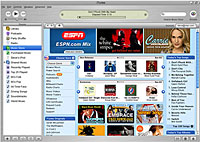 The Apple rumour mill has been cranking into overdrive over the weekend after Forbes reported that the company may be considering becoming a mobile phone operator.
The Apple rumour mill has been cranking into overdrive over the weekend after Forbes reported that the company may be considering becoming a mobile phone operator.
With Apple already rumoured to be developing a hybrid iPod/cell phone with Motorola, the article claims that “the pieces are in place for it to happen later this summer”, adding that companies like Virgin and Walt Disney have already proved that a new network model can allow all kinds of businesses to easily enter the mobile market.”
Disney will be launching its family-centric ‘Disney Mobile’ wireless phone network sometime next year, aiming to serve up a family-friendly mobile service with custom handsets and premium phone content (i.e. irritating ringtones and Disney-based games).
Since all the calls will be routed through Sprint’s national cellular network, Disney won’t have any infrastructure investment costs, but will gain access to a dedicated, direct marketing channel to da KidZ, scooping up network revenue and gaining a new content outlet.
Forbes predicts that Apple’s reputation for creating cool, user-friendly handheld gadgets could ease their transition into the mobile business.
In July last year, Apple announced its partnership with handset maker Motorola to create an iTunes-capable phone, but the product failed miserably to materialise at its scheduled CeBIT March 2005 launch.
 However, a report in the Sunday Telegraph yesterday claimed that Motorola will finally “unveil the first fruits of its partnership with Apple next month with the launch of its iTunes mobile phone at the V Festival.” The festival runs from 20th to 21st August 2005.
However, a report in the Sunday Telegraph yesterday claimed that Motorola will finally “unveil the first fruits of its partnership with Apple next month with the launch of its iTunes mobile phone at the V Festival.” The festival runs from 20th to 21st August 2005.
So far Apple is keeping Mum on the rumours about it entering the mobile market, although Steve Jobs has frothed enthusiastically about the cellular marketplace in the past:
“The mobile phone market…is a phenomenal opportunity to get iTunes in the hands of even more music lovers around the world.”
Forbes.com concludes that Apple is not the only big company that might roll out a cellular service this year with analysts suggesting that uber-brands like Nike and Wal-Mart could be planning their own networks.
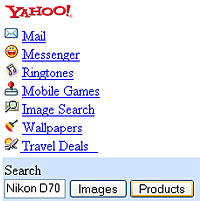 Yahoo! UK and Ireland have launched a handy new mobile search service which allows consumers to check the prices of goods via Yahoo! WAP services when they’re out and about.
Yahoo! UK and Ireland have launched a handy new mobile search service which allows consumers to check the prices of goods via Yahoo! WAP services when they’re out and about.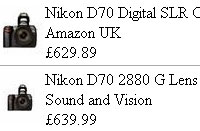 A result screen then displays images, pricing and product information, providing users with the low down about the cheapest prices around.
A result screen then displays images, pricing and product information, providing users with the low down about the cheapest prices around. However, if you persevere and click through to the next results page, a ‘compare’ link should magically appear under some products and this will let you access its full details.
However, if you persevere and click through to the next results page, a ‘compare’ link should magically appear under some products and this will let you access its full details. Mobile phone networks in London were overwhelmed for several hours following a series of terrorist blasts across central London.
Mobile phone networks in London were overwhelmed for several hours following a series of terrorist blasts across central London. As with 9/11, many people turned to the Web for news and updates, resulting in major news sites struggling with the enormous surge in traffic.
As with 9/11, many people turned to the Web for news and updates, resulting in major news sites struggling with the enormous surge in traffic.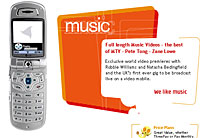 Consumer demand for mobile downloads is going bonkers, according to research by LogicaCMG.
Consumer demand for mobile downloads is going bonkers, according to research by LogicaCMG. Globally, subscribers just lurve downloading ring tones, games and music, with news and sports also gaining a growing audience in Europe.
Globally, subscribers just lurve downloading ring tones, games and music, with news and sports also gaining a growing audience in Europe.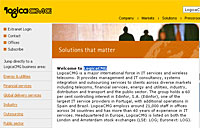 Mobile phone users are starting to experiment with their phones’ capabilities but, drawing a parallel with the popular SMS experience, it is clear that the service needs to be simple, safe and intuitive from initial browsing through to payment and download.
Mobile phone users are starting to experiment with their phones’ capabilities but, drawing a parallel with the popular SMS experience, it is clear that the service needs to be simple, safe and intuitive from initial browsing through to payment and download.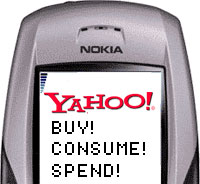 Buying goods with your PC may soon be as hip as dancing to a Chris De Burgh remix if the latest innovation from Yahoo Japan takes off.
Buying goods with your PC may soon be as hip as dancing to a Chris De Burgh remix if the latest innovation from Yahoo Japan takes off. A report in German news magazine Focus states that the German Federal Ministry of Transport, Building and Housing will be lifting its ban on the use of mobile phones on commercial flights.
A report in German news magazine Focus states that the German Federal Ministry of Transport, Building and Housing will be lifting its ban on the use of mobile phones on commercial flights. The technology for providing in-flight GSM coverage is already in place, with Swedish vendor Ericsson recently announcing a newly developed ‘GSM on Aircraft’ system.
The technology for providing in-flight GSM coverage is already in place, with Swedish vendor Ericsson recently announcing a newly developed ‘GSM on Aircraft’ system. Around a hundred rural African farmers around Makuleke are testing cell phone technology that gives them access to national markets via the Internet, allowing them to compete with the big boys and boost profits by at least 30 percent.
Around a hundred rural African farmers around Makuleke are testing cell phone technology that gives them access to national markets via the Internet, allowing them to compete with the big boys and boost profits by at least 30 percent. It’s believed that wireless technology is the best way to bring the Internet to the poor, as Africa’s sparsely-populated and often inhospitable landscapes make a landline infrastructure commercially unviable.
It’s believed that wireless technology is the best way to bring the Internet to the poor, as Africa’s sparsely-populated and often inhospitable landscapes make a landline infrastructure commercially unviable. There’s a hard business ethic at work here, with the companies keen to expand the cell phone market into rural areas and grab new customers before the competition steps in.
There’s a hard business ethic at work here, with the companies keen to expand the cell phone market into rural areas and grab new customers before the competition steps in. Quake to be ported to 3D-enabled mobile phones
Quake to be ported to 3D-enabled mobile phones Bluetooth group offers security tips to avoid attacks
Bluetooth group offers security tips to avoid attacks Etch A Sketch makes a comeback on mobile phones
Etch A Sketch makes a comeback on mobile phones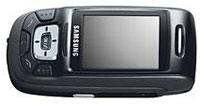 A study from mobile media firm Enpocket, asked which medium consumers would give up last if they had to choose between TV, newspapers, mobile phone, the Internet, radio and magazines.
A study from mobile media firm Enpocket, asked which medium consumers would give up last if they had to choose between TV, newspapers, mobile phone, the Internet, radio and magazines.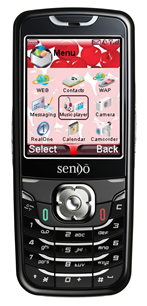 It’s not everyday a new mobile handset company comes along, so it was sad news to hear that Sendo, a relatively new entrant, had gone into administration. Motorola weren’t slow to see a good buy, and purchased it by the afternoon. Guy Kewney takes us through the reasons.
It’s not everyday a new mobile handset company comes along, so it was sad news to hear that Sendo, a relatively new entrant, had gone into administration. Motorola weren’t slow to see a good buy, and purchased it by the afternoon. Guy Kewney takes us through the reasons.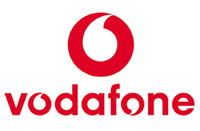 The ability to disconnect from the world has taken a further blow as Vodafone and Microsoft announce a global tied up to offer MSN Messenger IM to Vodafone’s mobile phone customers. People sitting at their MSN Instant Messaging (IM) client on their computers will be able to carry out chats with their Vodafone carrying chums.
The ability to disconnect from the world has taken a further blow as Vodafone and Microsoft announce a global tied up to offer MSN Messenger IM to Vodafone’s mobile phone customers. People sitting at their MSN Instant Messaging (IM) client on their computers will be able to carry out chats with their Vodafone carrying chums. Putting on his best tech-savvy face, Peter Bamford, Chief Marketing Officer for Vodafone glowed, “IM is a growing part of the increasingly important mobile messaging market. By bringing our collective customers together, we’ll deliver more options for staying in touch when messaging. Our agreement will grow IM and SMS, meaning additional revenue for Vodafone.”
Putting on his best tech-savvy face, Peter Bamford, Chief Marketing Officer for Vodafone glowed, “IM is a growing part of the increasingly important mobile messaging market. By bringing our collective customers together, we’ll deliver more options for staying in touch when messaging. Our agreement will grow IM and SMS, meaning additional revenue for Vodafone.” While we didn’t get to any exact figures, we were able to find out the service will be charged on the basis of each message sent. This will cause current IM users to radically change the way they use IM. No more will they be quickly replying with short witticisms, but will need to become more Bard-like in their compositions – if they don’t want to end up with huge bills at the end of the month.
While we didn’t get to any exact figures, we were able to find out the service will be charged on the basis of each message sent. This will cause current IM users to radically change the way they use IM. No more will they be quickly replying with short witticisms, but will need to become more Bard-like in their compositions – if they don’t want to end up with huge bills at the end of the month.